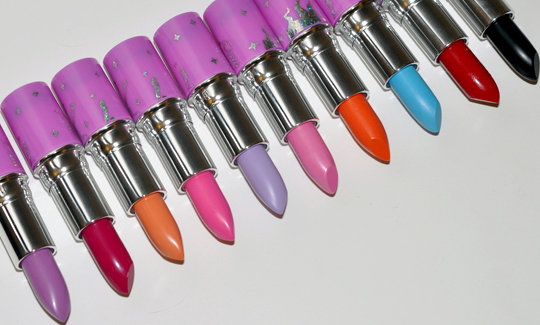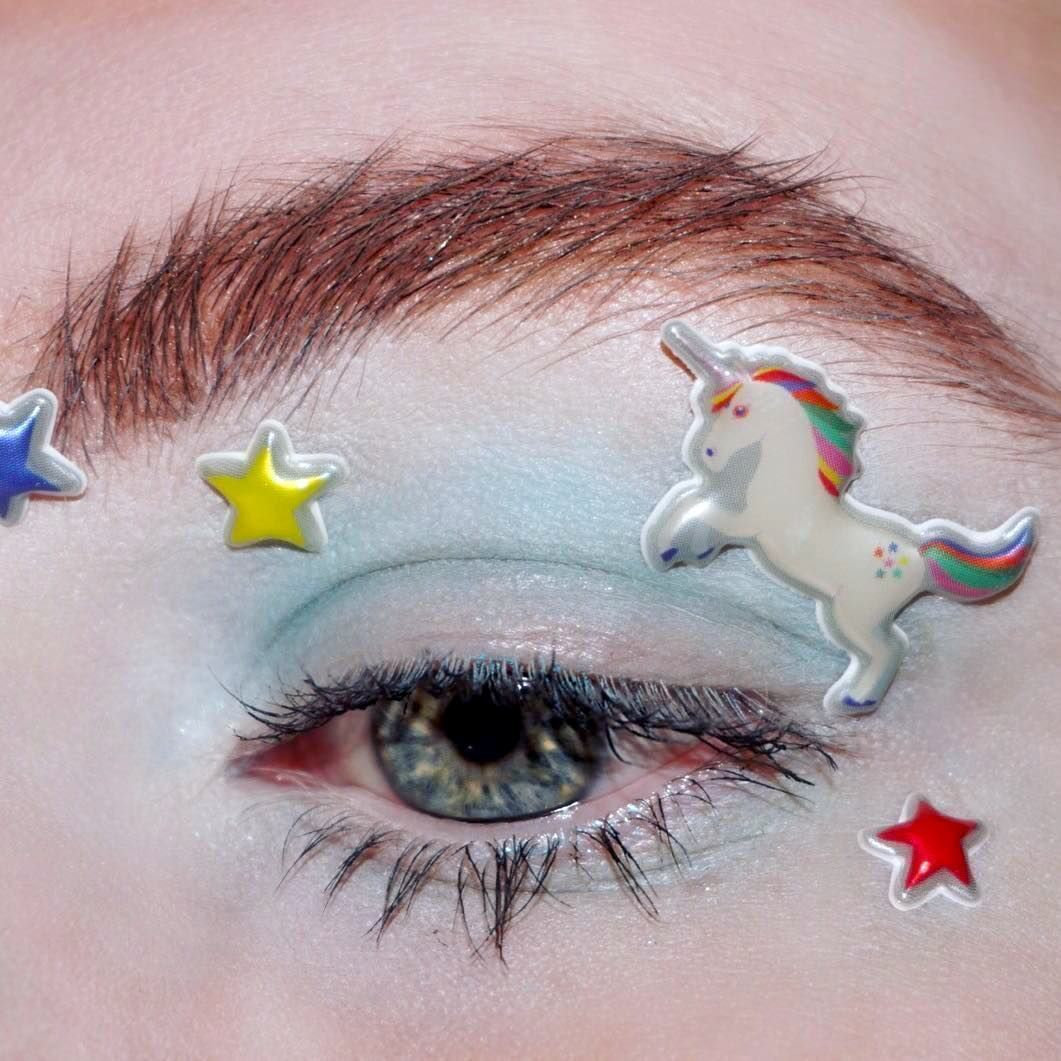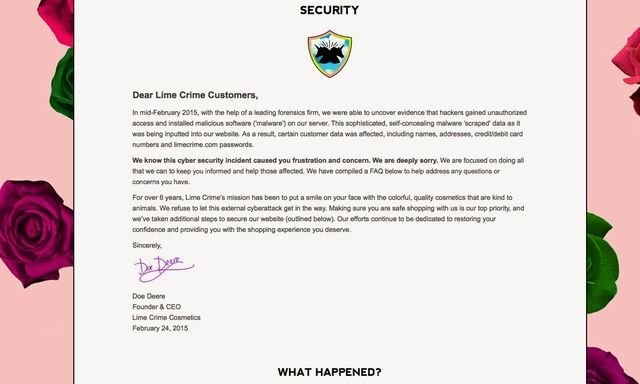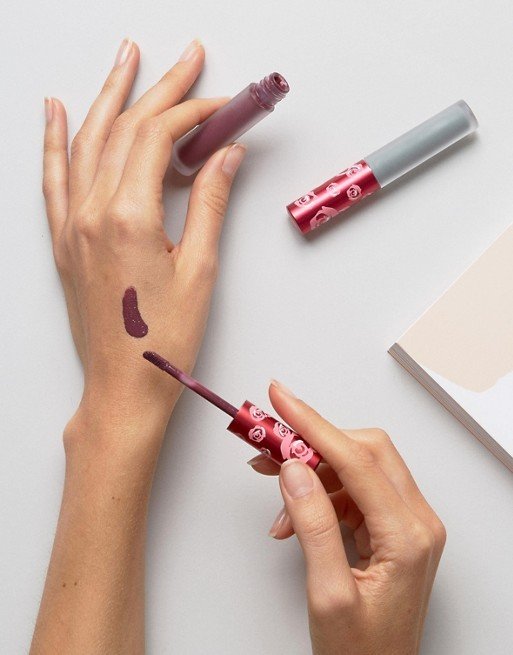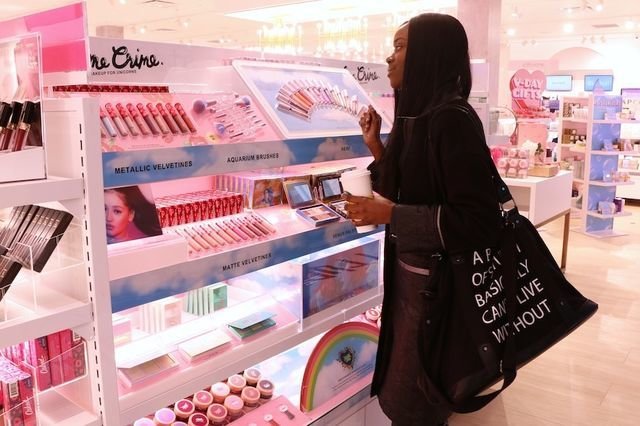Or rather, it was. Now that huge retailers like Urban Outfitters and Ulta carry Lime Crime, the brand is more mainstream — and accessible — than ever. The swirling brand controversy, which has previously involved Hitler costumes, lawsuits, and identity theft, had previously been so poisonous that any other brand would have withered on the vine. Except Lime Crime, it seems, is thriving. So how did an indie makeup brand like Lime Crime go from lightning rod to Ulta darling? Let’s take a look back at the controversy timeline to see how Lime Crime overcame its problematic past. In late 2003, Xenia started the LiveJournal group Little Big Girls, ostensibly to promote indie designers and lovers of vintage-goth-loli fashion. Membership was invite-only, and I personally felt VERY cool when I was invited to join in late 2004. Lime Crime was sold exclusively on eBay, and everything was designed and handmade by Xenia herself. She claimed to have attended, and dropped out of, FIT in New York City, which gave her brand an additional touch of professionalism. The Little Big Girls LiveJournal group was integral to Xenia’s early success, serving as a hype crew, audience, and customer base all in one. It was also where a lot of proto-Lime Crime drama started. And many members of the Little Big Girls community thought that Lime Crime’s “original” clothing designs looked an awful lot like Shrinkle’s. From what I remember, the (alleged) Shrinkle-Lime Crime copycat controversy caused a major rift in the Little Big Girls community. Xenia would later claim that she created the first ever makeup tutorials on the internet. Whether this is true or not, she was certainly one of the first to transform her LiveJournal fashion popularity into beauty caché. Members of the LiveJournal community were quick to point out that this aesthetic was, once again, eerily similar to another DIY designer. Supayana, who now designs kids clothes, had built up a MAJOR eBay following selling her handmade, retro-inspired dresses. Once again, LiveJournal got really angry at what was perceived as Xenia “copying” another creator. Though many of the Little Big Girls moderators say the dissolution of the online community predated this copying scandal, I remember this as the event that caused a MASSIVE exodus of LBG group members. I left the group and thought that was the last I’d hear of Xenia and Lime Crime. I was half right. In 2008, she wrote a story about her Halloween looks of years gone by — including an infamous Adolf Hitler costume from 2007 that she continues to be dragged for. In her 2008 post, she said the costume was “to test how much I could get away with,” and “I just wanted to wear the costume.” This post has since been deleted, but is available in a cached version here. This would become a major focus of fan controversy in the years to come. Also in 2009, members of the indie beauty community began to accuse Lime Crime of repackaging cheap mica pigments and reselling them for WAY more than they’re worth. Several bloggers were very outspoken about what they felt was a “deceptive” and “shady” practice. Lime Crime has never admitted to repackaging wholesale micas. In March 2010, Christine of Temptalia reviewed the Lime Crime lipsticks. This was a HUGE deal for an indie brand, as Temptalia was (and is) widely considered the most influential beauty blogger in the world. Christine gave the Lime Crime lipsticks a C-grade. Doe was not best pleased. After getting in the comments to defend the brand’s lipsticks, she mobilized her customers to go after Christine directly. Speaking to Racked, Christine recalls, “I wasn’t impressed with a lot of shades, so it wasn’t a glowing review. Lime Crime sent out an email to their customers and gave out my personal email address and asked customers to email me and tell me how great their lipsticks were.” This was seen as evidence of major pettiness on Lime Crime’s part. Many bloggers, including Mai (at Portrait of Mai) called the Lime Crime brand out for this appropriation. In response, Deere posted a salty non-apology on her Blogazine (since deleted, but screencapped here) in which she claims appropriation is not a thing. Millions of eyes rolled. Lime Crime also filed a lawsuit against the blogger behind website Doe Deere Lies, claiming damages due to defamation and lost sales. The critical site was taken down, but multiple others sprang up in its place. 2014 was also the year that Lime Crime brought on lifelong beauty expert Kim Walls as a brand consultant. And it was lucky that happened, because chaos was about to erupt. Instead of notifying customers by email, Lime Crime posted on Instagram to inform customers about this major security breach. Many people felt this was an insufficient response, and given Doe’s alleged “shady” personal history, some wondered if the brand was deliberately trying to cover it up. Though Lime Crime eventually reached out with emailed notifications, the damage was done. Many people had been victims of identity theft, and many others had been put off by what was perceived as a weak response by Lime Crime as a brand. Lime Crime locked down the company’s Instagram, allegedly deleted blog posts, and Doe herself took an internet sabbatical. Speaking about the data breach, Walls told Racked that “there were all kinds of challenges that fundamentally came down to not having enough people or the right people to handle the challenges that were happening at the time.” Once again, fans were mad. Many claimed they had been asking the brand about these particular ingredients for months, only to be blocked, banned, or ignored. Lime Crime claimed that this was all just a case of mislabelling, and this issue was handled quickly. Walls is also responsible for expanding Lime Crime far beyond the bounds of the internet. In 2017, Lime Crime was picked up by Riley Rose, Bloomingdale’s Glowhaus, Cult Beauty, and Ulta. Also in 2017, Lime Crime settled a class action lawsuit with customers who had money stolen during the data breach. As a result of that settlement — among other things — Lime Crime was legally required to improve its online security. This included hiring a chief information security officer, conducting product and risk data assessments, and continuing to provide customers with privacy policy updates. 2018 was also the year that Lime Crime partnered with Revolve to expand into China. According to Racked, “Selling a brand directly in China is tricky, because the country requires animal testing. To get around that, it partnered with Revolve to sell to China directly from the US in order to bypass the testing requirements.” So Lime Crime remains cruelty-free. Additionally, as Lime Crime’s presence in mainstream markets gets bigger, customers care less about early scandals. Many of Lime Crime’s current fans are young, and they simply don’t care about ancient LiveJournal drama. There’s currently speculation that Lime Crime may be sold sometime soon. Walls, who is definitely the person who turned the brand into the powerhouse it is today, says that Lime Crime “is in a time of transition… I’ve grown and sold several companies and that’s certainly part of my history.” As for the Lime Crime controversy? The brand is unbothered. In fact, there’s now an official “Lime Crime controversy” page on the brand’s website. The internet may never forget anything, but Lime Crime seems to prove that sometimes it just doesn’t matter.








